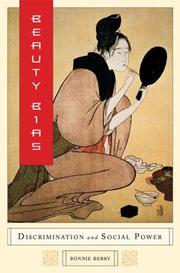| Listing 1 - 10 of 21 | << page >> |
Sort by
|
Book
ISBN: 1529702003 1529701996 1529702011 Year: 2020 Publisher: London : SAGE Publications Ltd,
Abstract | Keywords | Export | Availability | Bookmark
 Loading...
Loading...Choose an application
- Reference Manager
- EndNote
- RefWorks (Direct export to RefWorks)
This accessible and exciting new text looks at the implications of aesthetic labour for work and employment by contextualizing debates and offering a critical approach. The origins of aesthetic labour are explored, as well as the relevant theories from business and management, and sociology. Coverage includes key topics such as: corporate strategy; recruitment and selection practices; and discrimination. Key features include: - a range of case studies from across different types of organizations and popular culture - the exploration of topics such as branding, 'lookism', 'dressing for success' and cosmetic surgery - suggestions for further reading.
Physical-appearance-based bias --- Industries --- Social aspects

ISBN: 9780275990121 Year: 2007 Publisher: Westport (Conn.) : Praeger,
Abstract | Keywords | Export | Availability | Bookmark
 Loading...
Loading...Choose an application
- Reference Manager
- EndNote
- RefWorks (Direct export to RefWorks)
Beauty, Personal --- Physical-appearance-based bias. --- Social aspects.

ISBN: 9781591477921 Year: 2007 Publisher: Washington (D.C.) American Psychological Association
Abstract | Keywords | Export | Availability | Bookmark
 Loading...
Loading...Choose an application
- Reference Manager
- EndNote
- RefWorks (Direct export to RefWorks)
Body image --- Muscles --- Physical-appearance-based bias --- Physical fitness --- Somatotypes --- Social aspects --- Social aspects --- Social aspects
Book
ISBN: 9780197551073 9780197551080 Year: 2023 Publisher: New York Oxford University Press
Abstract | Keywords | Export | Availability | Bookmark
 Loading...
Loading...Choose an application
- Reference Manager
- EndNote
- RefWorks (Direct export to RefWorks)
"The Broadway Body I lied about my height on my résumé the entire time I was a dancer, though in truth I don't think the extra inch ever actually made a difference. In the US, 5'6" still reads as short for a man no matter how you slice it. The reason for my deception was that height was often the reason I was disqualified: choreographers often wanted taller male dancers for the ensemble and listed a minimum height requirement (often 5'11" and up) in the casting breakdown. Being disqualified before I could even set foot in the audition because I possessed an unchangeable physical characteristic that often made me unemployable in the industry. I was learning an object lesson in Broadway's body politics-and, of course, had I not been a white cisgender nondisabled man, the barriers to employment would have been compounded even further. I wasn't alone in feeling caught in a catch-22. Not being cast because of your appearance, or "type" in industry lingo, is casting's status quo. The casting process openly discriminates based upon appearance. This truism even made its way into a song cut from A Chorus Line (1975) called "Broadway Boogie Woogie," which comically lists all of the reasons one might not be cast: "I'm much too tall, much too short, much too thin/Much too fat, much too young for the role/I sing too high, sing too low, sing too loud." Funny Girl (1964) put it even more bluntly: "If a Girl Isn't Pretty/Like a Miss Atlantic City/She should dump the stage/And try another route"--
Musicals --- Physical-appearance-based bias --- Broadway --- Casting --- Auditions --- Political aspects --- History --- History and criticism
Book
ISBN: 9780754647584 0754647587 Year: 2008 Publisher: Aldershot : Ashgate,
Abstract | Keywords | Export | Availability | Bookmark
 Loading...
Loading...Choose an application
- Reference Manager
- EndNote
- RefWorks (Direct export to RefWorks)
Book
ISBN: 1498513913 9781498513913 9781498513913 9781498513906 1498513905 Year: 2015 Publisher: Lanham, Maryland : Lexington Books,
Abstract | Keywords | Export | Availability | Bookmark
 Loading...
Loading...Choose an application
- Reference Manager
- EndNote
- RefWorks (Direct export to RefWorks)
Embedded Racism untangles Japan's complex narrative on nationality and race and how it threatens its very survival. Incorporating a quarter-century of research by a naturalized Japanese citizen, it argues that Japan's economic and demographic decline is irreversible until it can accept immigrants, regardless of physical appearance, as 'new Japanese.'
Racism --- Nationalism --- Minorities --- Noncitizens --- Race discrimination --- Physical-appearance-based bias --- Social isolation --- Social aspects --- Social conditions. --- Law and legislation --- Japan --- Race relations.

ISBN: 9781593851996 1593851995 Year: 2005 Publisher: New York : Guilford Press,
Abstract | Keywords | Export | Availability | Bookmark
 Loading...
Loading...Choose an application
- Reference Manager
- EndNote
- RefWorks (Direct export to RefWorks)
Body image --- Discrimination against overweight persons --- Physical-appearance-based bias --- Image du corps --- Discrimination à l'égard des obèses --- Discrimination fondée sur l'apparence physique --- Social aspects --- Aspect social --- Body image. --- Discrimination against overweight persons. --- Physical-appearance-based bias. --- Klinische psychologie --- Social aspects. --- specifieke problemen --- specifieke problemen. --- Discrimination à l'égard des obèses --- Discrimination fondée sur l'apparence physique
Book
ISBN: 9781498513906 1498513905 9781498513920 1498513921 Year: 2015 Publisher: Lanham Lexington Books
Abstract | Keywords | Export | Availability | Bookmark
 Loading...
Loading...Choose an application
- Reference Manager
- EndNote
- RefWorks (Direct export to RefWorks)
"Despite domestic constitutional provisions and international treaty promises, Japan has no law against racial discrimination. Consequently, businesses around Japan display 'Japanese Only' signs, denying entry to all 'foreigners' on sight. Employers and landlords routinely refuse jobs and apartments to foreign applicants. Japanese police racially profile 'foreign-looking' bystanders for invasive questioning on the street. Legislators, administrators, and pundits portray foreigners as a national security threat and call for their segregation and expulsion. Nevertheless, Japan's government and media claim there is no discrimination by race in Japan, therefore no laws are necessary. How does Japan resolve the cognitive dissonance of racial discrimination being unconstitutional yet not illegal? Embedded Racism carefully untangles Japanese society's complex narrative on race by analyzing two mutually-supportive levels of national identity maintenance. Starting with case studies of hundreds of individual 'Japanese Only' businesses, it carefully analyzes the construction of Japanese identity through legal structures, statute enforcement, public policy, and media messages. It reveals how the concept of a 'Japanese' has been racialized to the point where one must look 'Japanese' to be treated as one. The product of a quarter-century of research and fieldwork by a scholar living in Japan as a naturalized Japanese citizen, Embedded Racism offers an unprecedented perspective on Japan's deeply-entrenched, poorly-understood, and strenuously-unacknowledged discrimination as it affects people by physical appearance"--Provided by publisher.
J4206 --- J4208.001 --- Japan: Sociology and anthropology -- communities -- racial and ethnic --- Japan: Sociology and anthropology -- communities -- racial and ethnic -- immigrants -- the West --- Racism --- Minorities --- Aliens --- Race discrimination --- Physical-appearance-based bias --- Social isolation --- Nationalism --- Physical-appearance-based bias. --- Race discrimination. --- Race relations. --- Racism. --- Social isolation. --- Social conditions. --- Law and legislation --- Social aspects --- Social aspects. --- Law and legislation. --- Japan --- Japan. --- Social conditions

ISBN: 0822327139 0822327023 0822381133 1282903896 9786612903892 Year: 2001 Publisher: Durham ; London : Duke University Press,
Abstract | Keywords | Export | Availability | Bookmark
 Loading...
Loading...Choose an application
- Reference Manager
- EndNote
- RefWorks (Direct export to RefWorks)
A dialogue among five eminent scholars--in law and philosophy--about laws based on appearance.
Discrimination --- Préjugés --- Prejudices --- Droit --- Law and legislation --- Physical-appearance-based bias. --- Prejudices. --- Bias (Psychology) --- Prejudgments --- Prejudice --- Prejudices and antipathies --- Attitude (Psychology) --- Emotions --- Appearance-based bias --- Appearance-based discrimination --- Appearance bias --- Appearance discrimination --- Body-size bias --- Look-ism --- Lookism --- Looks-ism --- Looksism --- Physical appearance discrimination --- Size bias, Body --- Size discrimination --- Sizeism --- Sizism
Book
ISBN: 0814728758 0814728340 0814727689 0814727697 Year: 2011 Publisher: New York, NY : New York University Press,
Abstract | Keywords | Export | Availability | Bookmark
 Loading...
Loading...Choose an application
- Reference Manager
- EndNote
- RefWorks (Direct export to RefWorks)
One of Choice's Significant University Press Titles for Undergraduates, 2010-2011To be fat hasn’t always occasioned the level of hysteria that this condition receives today and indeed was once considered an admirable trait. Fat Shame: Stigma and the Fat Body in American Culture explores this arc, from veneration to shame, examining the historic roots of our contemporary anxiety about fatness. Tracing the cultural denigration of fatness to the mid 19th century, Amy Farrell argues that the stigma associated with a fat body preceded any health concerns about a large body size. Firmly in place by the time the diet industry began to flourish in the 1920's, the development of fat stigma was related not only to cultural anxieties that emerged during the modern period related to consumer excess, but, even more profoundly, to prevailing ideas about race, civilization and evolution. For 19th and early 20th century thinkers, fatness was a key marker of inferiority, of an uncivilized, barbaric, and primitive body. This idea—that fatness is a sign of a primitive person—endures today, fueling both our $60 billion “war on fat” and our cultural distress over the “obesity epidemic. ”Farrell draws on a wide array of sources, including political cartoons, popular literature, postcards, advertisements, and physicians’ manuals, to explore the link between our historic denigration of fatness and our contemporary concern over obesity. Her work sheds particular light on feminisms’ fraught relationship to fatness. From the white suffragists of the early 20th century to contemporary public figures like Oprah Winfrey, Monica Lewinsky, and even the Obama family, Farrell explores the ways that those who seek to shed stigmatized identities—whether of gender, race, ethnicity or class—often take part in weight reduction schemes and fat mockery in order to validate themselves as “civilized.” In sharp contrast to these narratives of fat shame are the ideas of contemporary fat activists, whose articulation of a new vision of the body Farrell explores in depth. This book is significant for anyone concerned about the contemporary “war on fat” and the ways that notions of the “civilized body” continue to legitimate discrimination and cultural oppression.
Physical-appearance-based bias. --- Discrimination against overweight persons. --- Stigma (Social psychology) --- Body image. --- Anti-fat bias --- Fat bias --- Fat discrimination --- Fat oppression --- Obesity bias --- Obesity discrimination --- Oppression, Fat --- Overweight bias --- Overweight persons --- Physical-appearance-based bias --- Appearance-based bias --- Appearance-based discrimination --- Appearance bias --- Appearance discrimination --- Body-size bias --- Look-ism --- Lookism --- Looks-ism --- Looksism --- Physical appearance discrimination --- Size bias, Body --- Size discrimination --- Sizeism --- Sizism --- Discrimination --- Image, Body --- Imagery (Psychology) --- Mind and body --- Person schemas --- Personality --- Self-perception --- Human body --- Identity (Psychology) --- Shame --- Social psychology
| Listing 1 - 10 of 21 | << page >> |
Sort by
|

 Search
Search Feedback
Feedback About
About Help
Help News
News